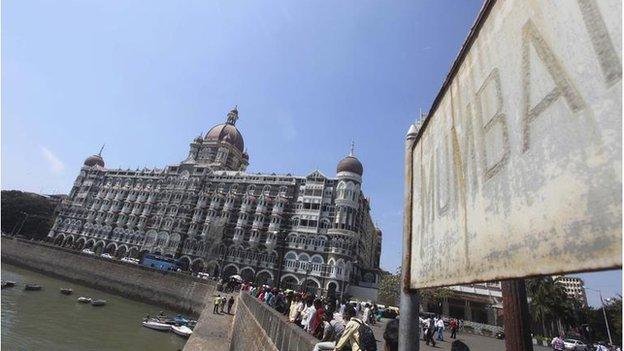Indian media: Mumbai attack lessons 'unlearnt'
- Published

Mumbai's Taj Mahal hotel, one of the sites of the 2008 attacks
Media are blaming politicians for not having a "coherent plan" to counter terrorism, five years after the deadly attacks in India's financial capital Mumbai.
Nearly 200 people were killed and hundreds injured in a series of co-ordinated attacks in the city in November 2008, which India blames on the Pakistan-based banned militant group Lashkar-e-Taiba.
"Post 26/11, India has adopted a piecemeal approach, with several components being out of sync," comments the Hindustan Times, external. It laments that a major plan to overhaul India's security apparatus after the attacks was not adopted due to "partisan politics and a singular lack of vision". "India has failed to move forward from 26/11," the paper concludes.
"Can India be surprised again? The answer, regrettably, is yes," says The Asian Age, external in an editorial headlined "Lessons unlearnt". The newspaper also points a finger at the politicians and recalls that parliament failed to approve the creation of a National Counter-Terrorism Centre. "As a country we have not let public discussion lead up to the formulation of a coherent plan of action, unlike say the US did after 9/11," writes The Asian Age.
The thought is echoed in an editorial in Hindi paper Dainik Jagran, external, which talks of "lethargy being shown" when it comes to ensuring the country's safety. "Five years after the Mumbai attacks, it is disappointing to see that not much change has taken place with respect to internal security and that Pakistan has not taken any action against those responsible for the attacks," says the paper.
The New Indian Express, external sees lapses not only in security arrangements, but a "bankruptcy of foreign policy on Pakistan" as well. According to the daily, "the military-intelligence-militant nexus in Pakistan that may have wished to provoke India into war through 26/11 remains in place". The paper also feels that "the manner in which the trial of some 26/11 suspects is being carried out in Pakistan is a mockery of justice", and expresses anger that India is not" bringing international pressure to bear on Pakistan".
Aarushi case
The official verdict in the long-running murder case of teenage girl Aarushi Talwar is headline news for all newspapers.
A court on Tuesday sentenced her parents, Rajesh and Nupur Talwar, to life imprisonment for the killing of both Aarushi and a Nepalese servant, Hemraj Banjade, in 2008.
The Asian Age, external is not convinced of their guilt. "The crux of the matter is the Talwars could not prove their innocence in the incriminating circumstances and must suffer the pain of losing a daughter and their freedom", it says in an editorial. "Unless a modern-day Hercule Poirot emerges from the pages of Agatha Christie... we will never know the absolute truth," the daily adds.
Terming the case a "modern-day tragedy", The Hindu, external says courts have a "duty to convince the public at the end of the trial that they have allayed all reasonable doubts".
The Tribune, external also feels the conviction has not led to a "sense of closure".
Sexual harassment
India's Supreme Court has set up a complaints panel after an intern accused a former judge of sexual harassment, the Deccan Herald, external reports.
The Gender Sensitisation and Internal Complaints Committee will also include an NGO representative. It was formed at the initiative of a group of women lawyers who pointed out that government guidelines necessitated the creation of such a body, the daily explains.
The decision comes at a time when the country is debating how to protect women after a series of harassment cases and sex assaults caused widespread anger in Indian society.
And finally, the Election Commission (EC) is for the first time planning to post assembly election results from five states on Facebook and Twitter on 8 December, the Hindustan Times, external reports.
Users will also be able to see which party or candidate is leading in a particular state or constituency.
The EC sees the elections as an opportunity to re-launch its social media presence, the paper adds.
BBC Monitoring, external reports and analyses news from TV, radio, web and print media around the world. For more reports from BBC Monitoring, click here. You can follow BBC Monitoring on Twitter , externaland Facebook, external.